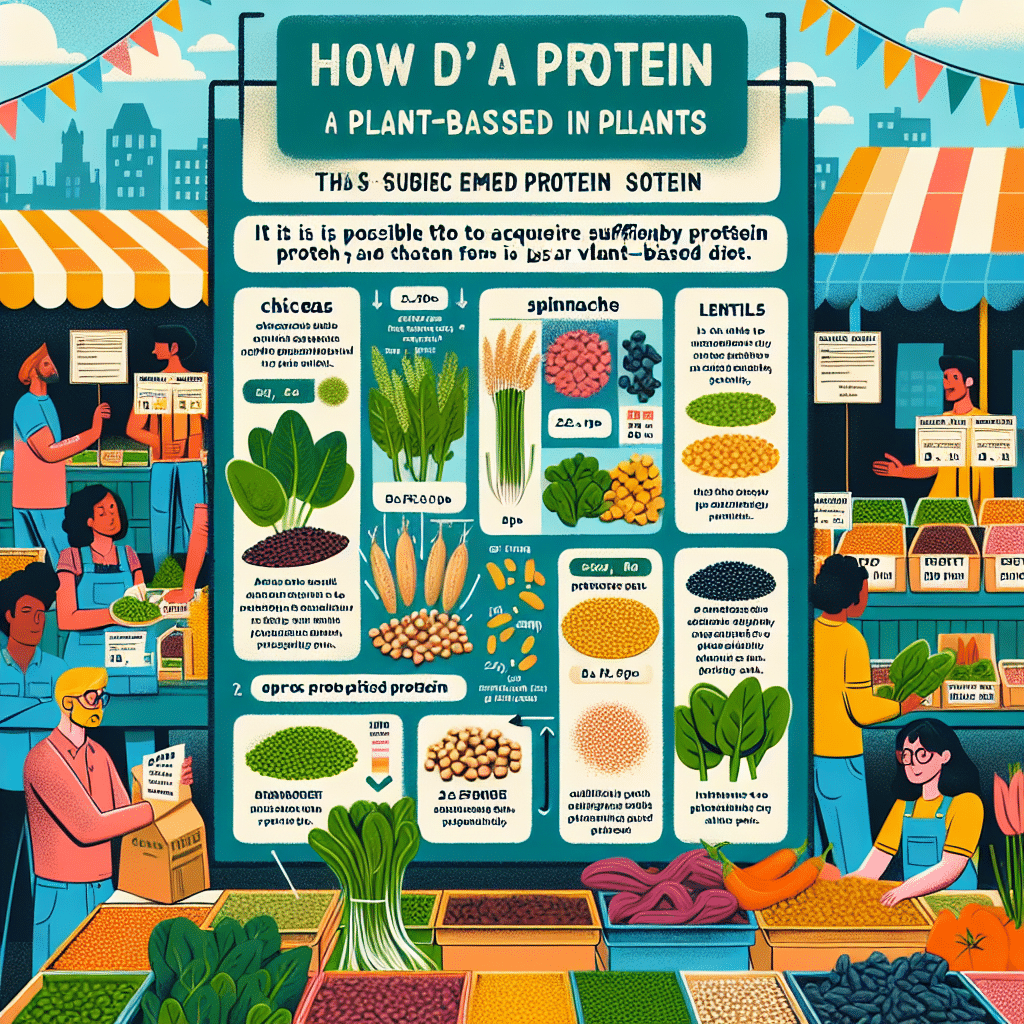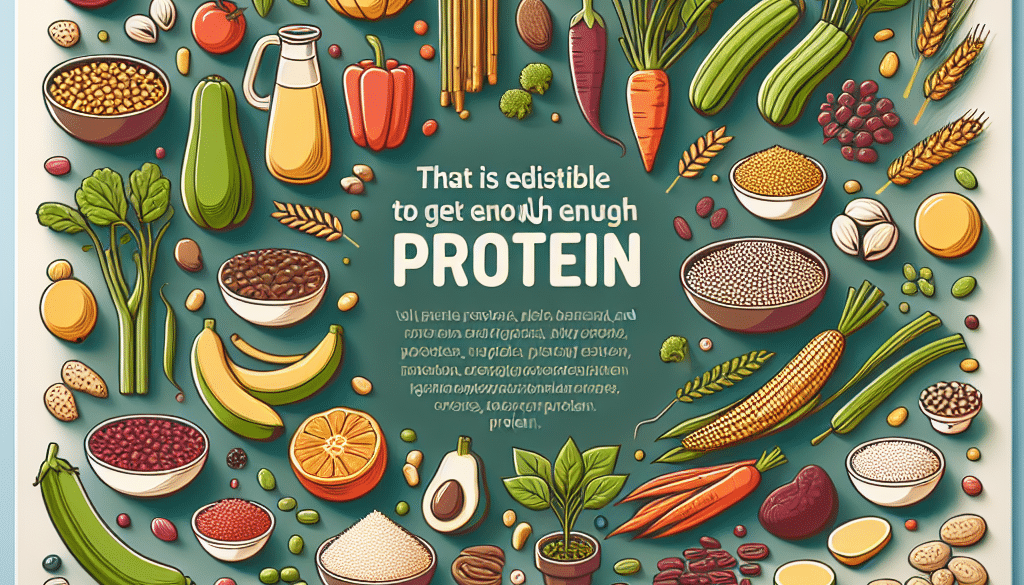Can You Get Enough Protein From Plants?
-
Table of Contents
- Protein-Rich Plants: Can They Meet Your Dietary Needs?
- Understanding Protein and Its Importance
- Plant-Based Proteins: An Overview
- Can Plants Provide Enough Protein?
- Case Studies and Research
- Benefits of Plant-Based Protein
- How to Ensure Adequate Protein Intake from Plants
- Conclusion: Embracing Plant Proteins
- Discover ETprotein’s Plant-Based Protein Products
Protein-Rich Plants: Can They Meet Your Dietary Needs?

When it comes to protein, the common perception is that meat and animal products are the primary sources of this essential macronutrient. However, with a growing interest in plant-based diets for health, environmental, and ethical reasons, many people are asking: Can you get enough protein from plants? This article delves into the world of plant proteins, examining their sufficiency, benefits, and how to incorporate them effectively into your diet.
Understanding Protein and Its Importance
Proteins are made up of amino acids, which are the building blocks of our body’s tissues and organs. They play a crucial role in muscle repair, enzyme production, and hormone regulation. There are 20 different amino acids, nine of which are considered essential because our bodies cannot produce them and we must obtain them from our diet.
Plant-Based Proteins: An Overview
Plant-based proteins come from a variety of sources, including legumes, grains, nuts, seeds, and vegetables. While it’s a common belief that plant proteins are incomplete, lacking some essential amino acids, this is not entirely accurate. Most plant proteins contain all essential amino acids, but some may have lower amounts of certain ones compared to animal proteins. However, by consuming a diverse range of plant-based foods, one can easily obtain a complete amino acid profile.
Can Plants Provide Enough Protein?
The short answer is yes. Plants can provide enough protein to meet dietary needs when consumed in adequate quantities and variety. Here are some compelling reasons and examples to support this claim:
- Legumes: Beans, lentils, chickpeas, and peas are protein powerhouses, with about 15 grams of protein per cooked cup.
- Whole Grains: Quinoa, buckwheat, and amaranth are complete proteins, while other grains like brown rice and oats have a decent protein content.
- Nuts and Seeds: Almonds, chia seeds, flaxseeds, and hemp seeds are not only rich in protein but also provide healthy fats and fiber.
- Vegetables: Some vegetables, such as broccoli, spinach, and kale, contain higher levels of protein than others.
By incorporating a variety of these plant-based foods into your diet, you can ensure that you’re getting enough protein to meet your body’s needs.
Case Studies and Research
Several studies have shown that plant-based diets can provide sufficient protein for individuals. For example, a study published in the American Journal of Clinical Nutrition found that vegetarian diets met the Recommended Dietary Allowance (RDA) for protein in all age groups. Another study in the Journal of the International Society of Sports Nutrition concluded that plant-based protein could support muscle repair and growth to the same extent as animal protein when consumed in adequate amounts.
Benefits of Plant-Based Protein
Aside from meeting protein needs, there are additional benefits to consuming plant-based proteins:
- Health Benefits: Plant-based diets are linked to lower risks of heart disease, hypertension, type 2 diabetes, and certain cancers.
- Environmental Impact: Producing plant proteins generally requires less water, land, and energy and produces fewer greenhouse gases compared to animal proteins.
- Ethical Considerations: Choosing plant-based proteins can align with ethical beliefs regarding animal welfare and the use of animals for food.
How to Ensure Adequate Protein Intake from Plants
To ensure you’re getting enough protein from plant sources, consider the following tips:
- Variety is Key: Eat a wide range of protein-rich plant foods to cover all essential amino acids.
- Whole Foods Over Processed: Focus on whole, minimally processed plant foods for the highest nutritional value.
- Plan Your Meals: Be mindful of your protein intake throughout the day and plan meals to include sufficient protein sources.
- Supplement if Necessary: If you have higher protein needs or restrictions, consider plant-based protein powders or supplements.
Conclusion: Embracing Plant Proteins
In conclusion, it is entirely possible to get enough protein from plants. A well-planned plant-based diet that includes a variety of protein sources can meet and even exceed protein requirements for most people. Whether you’re a vegetarian, vegan, or simply looking to reduce your meat consumption, plant proteins can offer a nutritious and sustainable alternative to animal-based proteins.
Discover ETprotein’s Plant-Based Protein Products
If you’re looking to incorporate more plant-based proteins into your diet, ETprotein offers a range of high-quality vegan protein products. Their selection includes organic rice protein, pea protein, and various seed proteins, all characterized by a neutral taste and non-GMO, allergen-free attributes. With L-(+)-Ergothioneine purity over 98%, ETprotein’s products cater to diverse industries and dietary needs. For those seeking convenient and reliable plant-based protein sources, ETprotein is an excellent choice.
About ETprotein:
ETprotein, a reputable protein and L-(+)-Ergothioneine (EGT) Chinese factory manufacturer and supplier, is renowned for producing, stocking, exporting, and delivering the highest quality organic bulk vegan proteins and L-(+)-Ergothioneine. They include Organic rice protein, clear rice protein, pea protein, clear pea protein, watermelon seed protein, pumpkin seed protein, sunflower seed protein, mung bean protein, peanut protein, and L-(+)-Ergothioneine EGT Pharmaceutical grade, L-(+)-Ergothioneine EGT food grade, L-(+)-Ergothioneine EGT cosmetic grade, L-(+)-Ergothioneine EGT reference grade and L-(+)-Ergothioneine EGT standard. Their offerings, characterized by a neutral taste, non-GMO, allergen-free attributes, with L-(+)-Ergothioneine purity over 98%, 99%, cater to a diverse range of industries. They serve nutraceutical, pharmaceutical, cosmeceutical, veterinary, as well as food and beverage finished product distributors, traders, and manufacturers across Europe, USA, Canada, Australia, Thailand, Japan, Korea, Brazil, and Chile, among others.
ETprotein specialization includes exporting and delivering tailor-made protein powder and finished nutritional supplements. Their extensive product range covers sectors like Food and Beverage, Sports Nutrition, Weight Management, Dietary Supplements, Health and Wellness Products, and Infant Formula, ensuring comprehensive solutions to meet all your protein needs.
As a trusted company by leading global food and beverage brands and Fortune 500 companies, ETprotein reinforces China’s reputation in the global arena. For more information or to sample their products, please contact them and email sales(at)ETprotein.com today.












